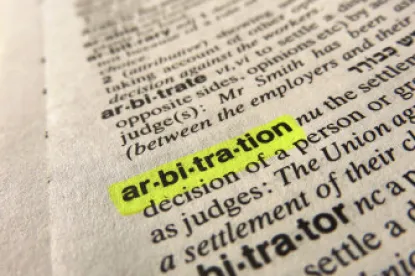In CBF Industria de Gusa S/A v. AMCI Holdings, Inc., 2017 U.S. App. LEXIS 3815 (2d Cir. Mar. 2, 2017), the U.S. Court of Appeals for the Second Circuit provides something of a primer regarding enforcement in the United States of a foreign-issued arbitral award, which is subject to the United Nations Convention on the Recognition and Enforcement of Foreign Arbitral Awards (“New York Convention”) and Chapter 2 of the Federal Arbitration Act (“FAA”). In an effort to clear up confusion, the court (i) defined several pertinent terms and explained their significance, (ii) urged practitioners and judges to use consistent terminology, (iii) examined when a district court sits in primary jurisdiction versus in secondary jurisdiction, (iv) explained the differences between a non-domestic arbitral award and a foreign arbitral award, and (v) described the treatment of each when brought to a U.S. district court for enforcement.
The court’s principal teaching was that in order to enforce an award that was issued (or “made”) outside the U.S. — i.e., a foreign arbitral award — in a U.S. court, the award-creditor need not commence a proceeding to confirm the award. Indeed, the word “confirm,” as used in FAA § 207, is a misnomer when referring to a foreign arbitral award: “Section 207 uses the term ‘confirm’ to describe the process by which a district court acts under its secondary jurisdiction to recognize and enforce a foreign arbitral award,” but “the proper term for the single-step process in which a federal district court engages when it sits in secondary jurisdiction over a foreign arbitral award is ‘Enforcement,’. . . .”
Recognizing an inconsistent use of terminology in the pertinent case law, the court advised:
we encourage litigants and district courts alike to take care to specify explicitly the type of arbitral award the district court is evaluating (domestic, nondomestic, or foreign), whether the district court is sitting in primary or secondary jurisdiction, and, accordingly, whether the action seeks confirmation of a domestic or nondomestic arbitral award under the district court’s primary jurisdiction or enforcement of a foreign arbitral award under its secondary jurisdiction.
Under the New York Convention an arbitration award is to be “confirmed,” if at all, in the jurisdiction in which it was issued. Elsewhere, the award may be enforced, but an award creditor is not required to seek confirmation of the award. Thus, as a practical matter, an award debtor bears a burden to seek vacatur of an award in the jurisdiction in which it was issued, or the award may be enforced — subject only to very narrow defenses — in any country where the New York Convention is in force. (Indeed, certain recent decisions have shown that even vacatur of an award where it was issued may not preclude enforcement elsewhere. See, e.g., Corporación Mexicana de Mantenimiento Integral v. Pemex-Exploracion y Produccion, No. 13-4022 (2d Cir. Aug. 2, 2016) (applying Panama Convention Art. v(1)(e)).)
The chart below provides a simple guide.
|
Type of Arbitral Award |
Description |
Jurisdiction Type |
Procedural Terminology |
|
Domestic |
Issued in U.S. in arbitral proceeding with no non-U.S. aspects among U.S. domiciled parties. |
Primary |
Action for confirmation under 9 U.S.C. §9 |
|
Non-domestic |
1. Issued in U.S. – the agreed place of arbitration. 2. Subject to FAA ch. 2 because (1) it was “made within the legal framework of another country, e.g., pronounced in accordance with foreign law[,]”; or (2) if decided under the laws of the U.S., it [a] involves entities that are not U.S. citizens; [b] involves “property located abroad; [c] envisages performance or enforcement abroad; or [d] has some other reasonable relation with one or more foreign states” |
Primary |
Action for confirmation under 9 U.S.C. §207. “The process by which a nondomestic arbitral award is reduced to a judgment of the court by a federal court under its primary jurisdiction is called “confirmation.” “Under its primary jurisdiction in a confirmation proceeding, the district court is, as this court has recognized, ‘free to set aside or modify an award in accordance with its domestic arbitral law and its full panoply of express and implied grounds for relief.’” |
|
Foreign |
Issued outside the U.S. |
Secondary |
Action for Enforcement under 9 U.S.C. §207. Though Section 207 uses the word “confirm” (and its variants), the Second Circuit emphasized that the procedure is called “enforcement”: “the proper term for the single-step process in which a federal district court engages when it sits in secondary jurisdiction over a foreign arbitral award is ‘Enforcement,’” “Section 207 uses the term ‘confirm’ to describe the process by which a district court acts under its secondary jurisdiction to recognize and enforce a foreign arbitral award.” No requirement to commence an action to “confirm” the award. |
The Second Circuit also clarified the nature of the procedure for enforcing a foreign arbitral award against a party who was not a subject of the award and who did not participate in the arbitration (i.e., a “third party”). In CBF Industria, the appellants (“CBF”) first obtained an arbitral award in Paris against a bankrupt respondent (“SBT”) and then commenced an action in a U.S. district court to enforce that foreign award against alleged alter egos of the award-debtor. The alleged alter egos were not parties to, nor participants in, the arbitration. The Second Circuit held that award creditor CBF “properly sought to have the district court enforce a foreign arbitral award under its secondary jurisdiction.”
Generally, award-enforcement proceedings are governed by the law applicable to the enforcement of judgments in the jurisdiction. Accordingly, the court of appeals stated:
the question of whether a third party not named in an arbitral award may have that award enforced against it under a theory of alter-ego liability, or any other legal principle concerning the enforcement of awards or judgments, is one left to the law of the enforcing jurisdiction, here the Southern District of New York . . . .
Thus, the court of appeals remanded the case, instructing the district court to adjudicate the enforcement action — particularly CBF’s effort to reach the alleged alter egos of SBT — “under the standards set out in the New York Convention, Chapter 2 of the FAA, and applicable law in the Southern District of New York.”
But the court’s phrase “the law of the enforcing jurisdiction” does not definitively identify the substantive law that will govern the analysis of whether an alter ego relationship exists for purposes of enforcing the award against a third party. Should the district court apply New York State law? Federal common law? Both? Including their conflict of law principles? Would any of those options require the district court to look to the laws of Switzerland, where the award-debtor SBT was formed, existed, and filed for bankruptcy?
In the end, the court of appeals vacated the district court’s dismissal of the award creditor’s action to enforce the award, and remanded the case for further proceedings consistent with the opinion of the court of appeals. Therefore, issues concerning the precise governing law were left to be adjudicated by the district court in subsequent proceedings.




 />i
/>i

